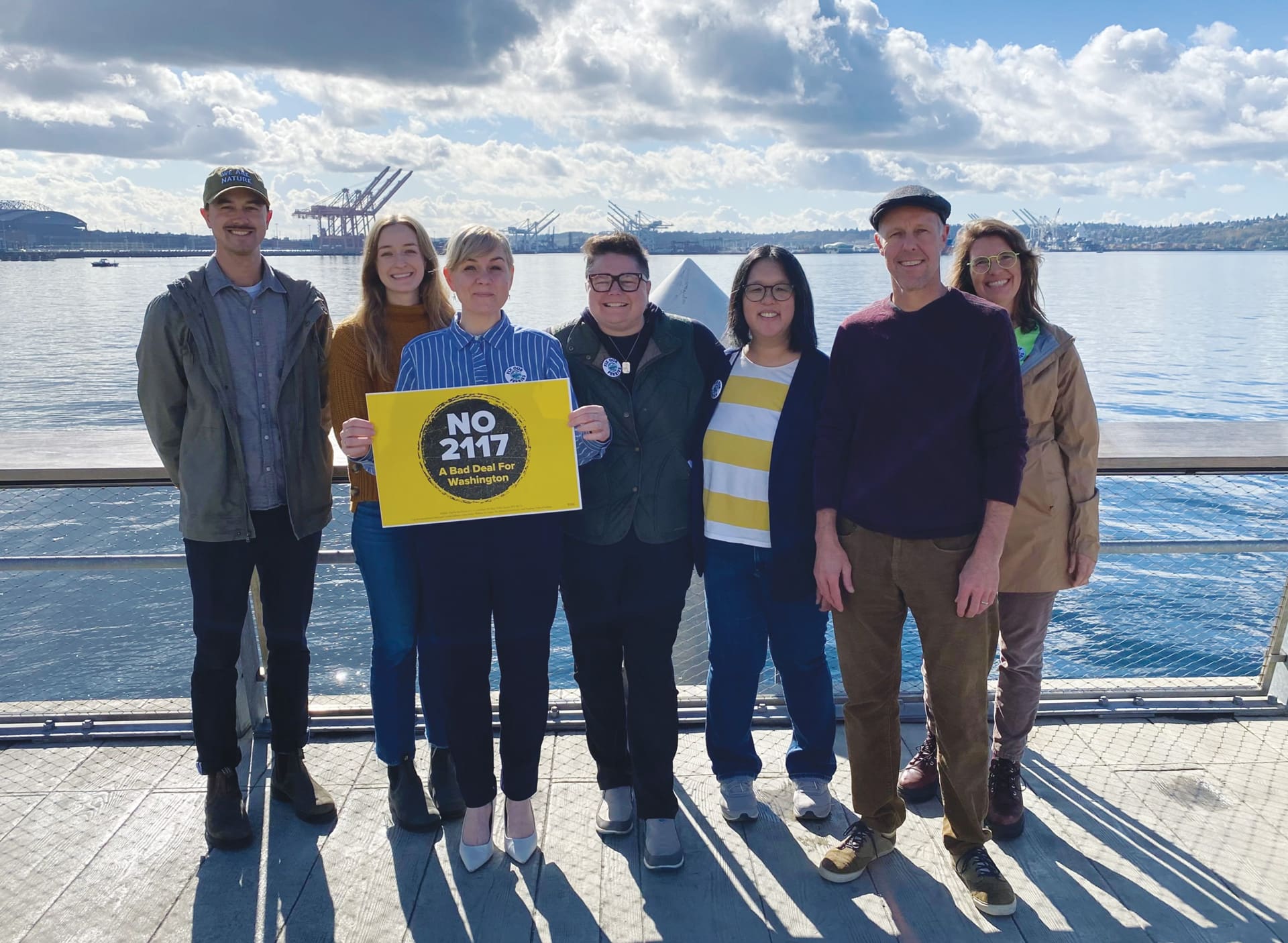
Small Business Advocates, Labor Leaders, Commuters, & Ferry Workers Warn of Funding Cuts to Washington’s Ferry System If Initiative 2117 Passes
With System in Crisis, I-2117 Would Cut Funding for One-Third of the Cost of Each New Hybrid Electric Ferry
I-2117 Would Also Cut 100 Percent of Funding for Electrifying State’s Ferry Terminals, Free Transit for Youth
Seattle, WA, October 17, 2024 – Small business advocates representing island communities, labor leaders, ferry commuters, and ferry workers gathered today on the Seattle waterfront near Washington State Ferries’ (WSF) Colman Dock to warn Washington voters about funding cuts to the state’s ferry system threatened by Initiative 2117.

Labor leaders, conservation leaders, small business representatives, and ferry workers gathered at Pier 62 to speak out against Initiative 2117
WSF is the largest operating public ferry system in the United States and serves as a marine highway for the state’s businesses, tourists, and commuters.
If passed, I-2117 would devastate funding for the state’s ferry system, including cuts to:
- Approximately one-third of the funding needed for the purchase of each new hybrid electric ferry to replace the state’s aging fleet of vessels.
100% of the funding for planned shore power projects for the new hybrid electric vessels. - Funding for modernizing and converting the state’s current vessels to electric hybrid.
- Funding for electrifying the state’s ferry terminals;
$2 million for Kitsap Transit’s shore power project to service their new electric passenger ferry. - 100% of the funding to replace the vessel that serves Guemes Island.
- 100% of the funding for the program that provides youth under 18 with free transit passes across the state, including on our state’s ferries.
I-2117 would cut one-third, or $5.4 billion, of the state’s multi-year transportation funding plan. Along with cuts to funding for new ferries, I-2117 would put major road projects at risk of delay or cancellation, reduce public transit service, and cut funding for the Safe Routes to School program. These cuts would create additional pressures on the state’s overall transportation funding plan.
I-2117 would cut funding for our ferry system as the long-term need for funding new ferries grows. WSF recently identified approximately $5.5 billion in long-term, unfunded needs for the system. This includes approximately $4 billion in funding for 11 new hybrid electric ferries. To keep pace with vessel retirements and expand the overall fleet, WSF will need to acquire a new ferry each year.
“Ferry systems are the lifeblood of our island communities, and truly our only roads home. But the crisis within our ferry system affects the economic health and quality of life of people and businesses across the state,” said Amy Drayer, Director of Islanders for Ferry Action at the Vashon Island Chamber of Commerce. “Fruit from Yakima rots on Seattle docks. Ambulances are delayed on hospital runs, patients miss medical treatments, residents lose wages, and small businesses lose employees and income. If 2117 passes, that loss of funding will plunge our ferry system deeper into crisis, further devastating struggling communities that depend on our already fragile marine highways.”
“Initiative 2117 is a direct threat to workers, commuters, and the wider community that relies on our ferry system to get to work, attend school, and keep medical appointments,” said Peter Hart, Secretary-Treasurer, Inlandboatmen’s Union of the Pacific (IBU). “I-2117 would slash millions for a ferry system that’s already in crisis. IBU joins more than 35 labor unions across Washington state in strong opposition to I-2117.
To learn more about investments in the state’s ferry system that would be cut by I-2117, visit the Clean & Prosperous Institute’s Risk of Repeal map.
Over 500 organizations and Tribal Nations oppose I-2117 and have endorsed the No on 2117 campaign, including firefighters, small businesses, Tribal Nations, doctors and public health leaders, labor unions, and environmental groups. You can view the full list of organizations opposing I-2117 here.

